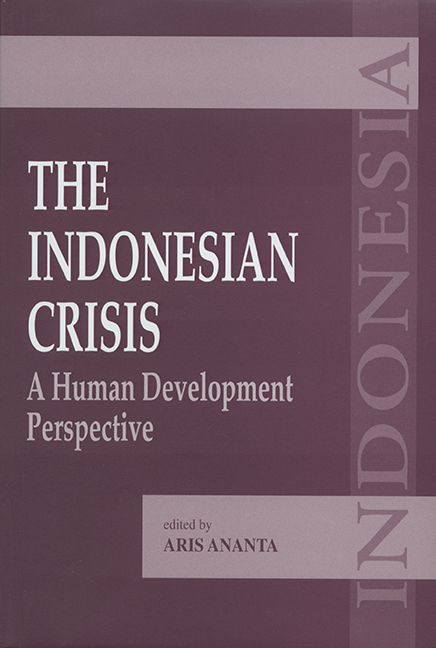Book contents
- Frontmatter
- Contents
- Acknowledgements
- List of Contributors
- Part I Introduction
- 1 What Do We Learn from the Crisis? Insights on Human Development in Indonesia during 1997–99
- 2 Macroeconomic Recovery: Facts and Prospects
- 3 Indonesia's Economic Transformation: Before and During the Economic Crisis
- 4 Modelling the Repercussions of Financial Shock on Socio-economic Indicators
- Part II Human Capital
- Part III Purchasing Power
- Part IV Emerging Issues
- Index
1 - What Do We Learn from the Crisis? Insights on Human Development in Indonesia during 1997–99
from Part I - Introduction
Published online by Cambridge University Press: 21 October 2015
- Frontmatter
- Contents
- Acknowledgements
- List of Contributors
- Part I Introduction
- 1 What Do We Learn from the Crisis? Insights on Human Development in Indonesia during 1997–99
- 2 Macroeconomic Recovery: Facts and Prospects
- 3 Indonesia's Economic Transformation: Before and During the Economic Crisis
- 4 Modelling the Repercussions of Financial Shock on Socio-economic Indicators
- Part II Human Capital
- Part III Purchasing Power
- Part IV Emerging Issues
- Index
Summary
Introduction
Economic development can be seen simply as sustainable economic growth over a long period. This is the narrowest definition of economic development, often equivalent to the concept of economic growth, which emphasizes capital accumulation. Without high economic growth, no development of social issues such as education and health can take place. This narrow definition of economic development has a special advantage as it is relatively easy to measure the dynamics of national income.
Development can also be seen as structural and qualitative changes in the economy. Therefore, this concept of development covers not only monetary variables, but also social variables. Sen (1999) goes even further. He sees development as “a process of expanding the real freedoms that people enjoy”. This freedom depends on variables such as gross national product (GNP), industrialization, and technological advance, but freedom also depends on other determinants such as social and political rights. However, it is not easy to measure this kind of development.
Since 1990, the United Nations Development Programme (UNDP) has advocated the concept of human development. In its Human Development Report 1991, it mentions that for a very long time the question had been centred on the growth of the economy. However, they argue that the question should focus rather on the welfare of the people.
Human development involves much more than national product. It aims to create an environment in which “people can develop their full potential and lead productive, creative lives in accord with their needs and interests” (UNDP, 2001). People are seen as the wealth of the nation and development is to expand the choices available to the people, thus giving them more freedom to choose. Economic growth is very important, but it is only one of the means of increasing freedom.
Every year the UNDP publishes a special report, with a different emphasis, on the progress of human development in all countries of the world. The UNDP recommends HDI (human development index) as a measurement of development, which is relatively easy to follow. HDI is defined as comprising human capital (measured by education and health) and purchasing power (measured by parity purchasing power). It suggests that HDI should replace the conventional way of measuring development, which is based on the dynamics of economic growth.
- Type
- Chapter
- Information
- The Indonesian CrisisA Human Development Perspective, pp. 3 - 28Publisher: ISEAS–Yusof Ishak InstitutePrint publication year: 2002

